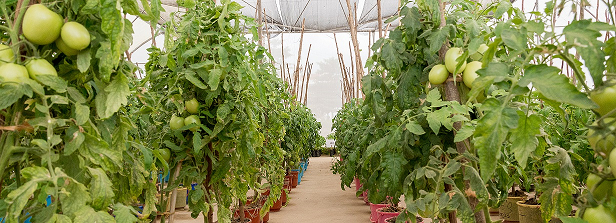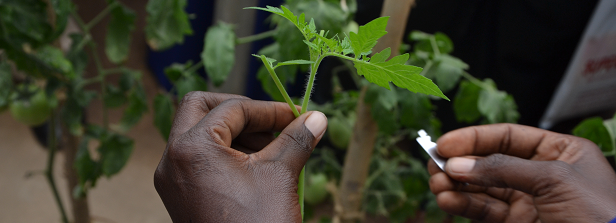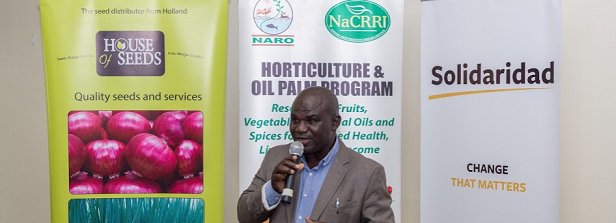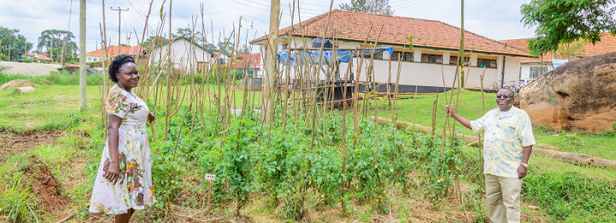Improved Resilience Through Sustainable Production Of Grafted Tomatoes In Uganda (IRESO)
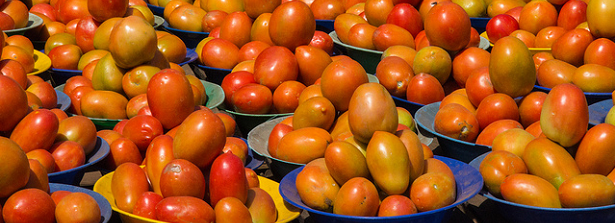
Duration: 01 January 2017 to 31 December 2019
Project information
Aim: Tomatoes serve as a source of livelihood for many rural farmers in Uganda, mainly produced by all gender groups and has potential for increasing income, improving living standards and employment creation. Its production and productivity in Uganda has been limited by Bacterial wilt.
This project “Improved Resilience Through Sustainable Production Of Grafted Tomatoes In Uganda (Project – IRESO)” with the goal of building wealth and resilience, will map the prevalence rate of bacterial wilt in Uganda. At the same time the resistant genotypes in Uganda, Asia and the Netherlands will be identified, that can be used as root stock for grafting with commercial genotypes. Participatory on-farm and on-station trails will be undertaken for selection of resistant genotypes, to be used as root stock. Commercial seedling production will be promoted through 20 commercial nurseries, managed by the 500 youths. Building the capacity of farmers on GAP for high yields will be emphasised. Lessons learned and challenges will be disseminated through different forums, publications and electronic means to reach a wider clientele.
Objectives: The overall goal of this project is to improving Wealth, Nutrition and Resilience through sustainable production of Grafted Tomatoes, with 4,500 beneficiaries in Uganda. Specific objectives (SO) are:
- SO 1: Mobilization, Situation analysis and assess prevalence of bacterial wilt and socio-economic impact of the disease in key tomato producing districts in Uganda.
- SO 2: Screen tomato rootstocks for Bacterial Wilt tolerance in Uganda.
- SO 3: Commercialised Grafted tomato seedling production with youths through Young Plant Risers (YPR) Nurseries.
- SO 4: Improve the capacity of 4,000 smallholder tomato farmers for commercial production of grafted tomato fruits in Uganda.
- SO 5: Create awareness on the potential of grafted Tomato technology through knowledge development and dissemination.
Method: The research project will consist of four stages: Research and learning from current practices, involving mapping of the targeted districts on disease distribution in terms of space and strains and its social-economic impact; Screening of bacterial wilt resistant root stocks, specific to each location from local or new genotypes; Participatory on-farm on-station trials; and Commercial production of the grafted seedlings through Young Plant Raisers (YPR) managed by the youths. Capacity enhancement on good agricultural practices, business development and knowledge dissemination will build on sustainability.
Country: Uganda.
Dutch policy goals: Eradicating existing hunger and malnutrition (‘people’); Promoting inclusive and sustainable growth in the agricultural sector (‘profit’); and Creating ecologically sustainable food systems (‘planet’) .
Progress reports
Year 1: Tomatoes are commonly used in Uganda as sources of nutrition and income. Project IRESO intends to graft scions of susceptible market demanded tomato varieties onto resistant tomato root stocks against the limiting Bacterial wilt (Ralstonia Solanacearum). Phase 01 of 03 replication performance experimental trials using 02 scions and 02 root stocks from Enza Zaden Export B.V and 01 root stock and controls from the National Crops Resources Research Institute (NaCCRI) is on-going.
A target of 500 youths and 4,000 farmers are being mobilized to participate on Project IRESO in the Districts of Wakiso, Luwero, Mpigi, Mukono and Kabale.
A principal Investigator, Department of Agricultural Economics, College of Agricultural and Environmental Science, Makerere University was identified to lead the exercise of benchmarking, progress measurement framework, end evaluation, case studies and collection of disease samples together with 02 MSc. Students.

